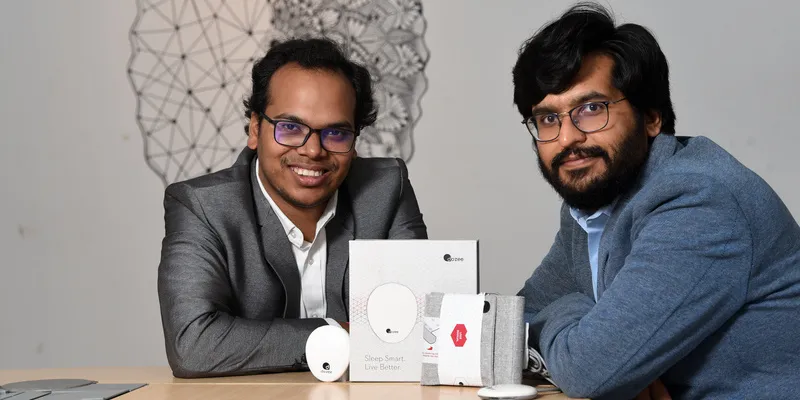Startups fight COVID-19: This Bengaluru startup’s contactless sheet is turning every bed into an ICU monitoring bed
Bengaluru-based healthtech startup Turtle Shell Technologies’ contactless device Dozee can turn any bed into an ICU and oxygen monitoring bed.
To date, India has recorded over 17.3 million active COVID-19 cases with more than two lakh deaths. And the numbers keep growing each day.
Amidst a seething second wave, there has been a severe dearth of oxygen, hospital beds, and vital medicine essential for treating COVID patients. In fact, for healthcare workers, the pressure keeps mounting. India has a shortage of healthcare staff, with a ratio of 1:40. When dealing with a pandemic, this gap becomes overwhelming.

Mudit and Gaurav, founders of Dozee
To help make their lives easier and also tackle the scarcity of ICU beds in hospitals, Turtle Shell Technologies — a Bengaluru-based healthtech startup — has come up with a solution, , to turn all beds into step-down ICUs. These could either be hospital beds or individual beds at home.
Launched in mid-2019, Dozee is the brainchild of IIT graduates Mudit Dandwate and Gaurav Parchan.
The solution — a thin sheet of sensor that goes under the mattress aligned with the chest level of the user — monitors the vibrations produced in each heartbeat, respiration cycle, and body movements. The startup has also set up Patient Monitoring Cells within hospitals to ensure 24×7 on-ground support and alert escalation.
The algorithm converts it into different biomarkers and monitors the heart rate, respiration rate, blood pressure oxygen saturation, and many other clinical parameters of a patient continuously. All these data are transmitted to a remote dashboard, where, from a single screen, one nurse can monitor the health of about 150 to 200 patients.
Mudit Dandwate, Co-founder and CEO, Dozee, says, “We track how many nursing hours were saved, and how many lives were impacted with successful and timely ICU transfers. In one hospital, we have more than 150 devices, monitoring continuously over the last six months. We have monitored more than 4,000 patients, generated about 1,100 alerts, and we have achieved close to 337 successful transfers or changes in oxygen therapy.”
How does it help?
The startup’s product increases the efficiency of nurses as they don’t need to check multiple patients frequently. In fact, the device also generates alerts and puts out trends.
For instance, if a patients’ respiration rate is increasing, or the heart rate is falling, or the saturation is declining, the device sends a proactive alert to provide immediate attention, thereby improving their outcomes.
“We are focussed on helping the healthcare workers by buying them some much-needed time. There are several activities like collecting vitals, giving medications, food, injections, and briefing doctors that most nurses and caretakers end up doing. With our device, we can track the vitals on a real-time basis,” explains Mudit.
He adds that for medical care, data is important. He says while ICU monitors keep continuously monitoring a person's heart respiration, blood pressure, and oxygen saturation, Dozee does the same work with every bed, and not just with ICU beds.
The device — officially launched only a week ago — is now used by over 150 Indian hospitals and more than 1,000 families. It follows a rental model, where it charges Rs 2,990 for 15 days and Rs 3,990 for 30 days.
Last year, the healthtech startup started building on the contactless health monitor, which can track heartbeat, respiration, sleep, and stress recovery with a medical-grade of 98.4 percent accuracy.
Besides hospitals, the healthtech startup is also bringing hospital-like care to home. It continuously monitors all data at home to be shared with the doctors.
“With COVID-19, oxygen saturation dropping and respiration rates changing are vital signs, especially among those with higher HRTC scores. The device monitors all of this so that you don’t have to wait till the last minute to rush to the hospital,” says Mudit.
Edited by Suman Singh



![[The Turning Point] How a pet dog helped these entrepreneurs to start healthtech startup Dozee](https://images.yourstory.com/cs/2/79900dd0d91311e8a16045a90309d734/LtoRMuditDantwateGauravParchani1-1605191837613.JPG?fm=png&auto=format&h=100&w=100&crop=entropy&fit=crop)




